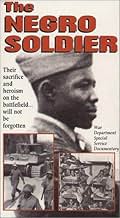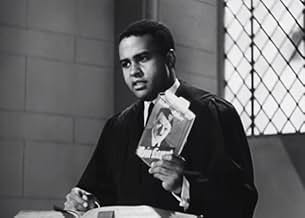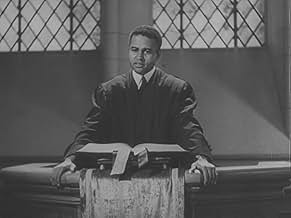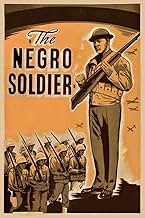Ajouter une intrigue dans votre langueDocumentary focusing on the contributions to the American war effort of African-American soldiers.Documentary focusing on the contributions to the American war effort of African-American soldiers.Documentary focusing on the contributions to the American war effort of African-American soldiers.
- Réalisation
- Scénario
- Casting principal
- Récompenses
- 2 victoires au total
Clyde Turner
- Soloist in Church
- (as Sgt. Clyde Turner)
Bertha Woolford
- Mrs. Bronson
- (as Bertha Wolford)
Norman Ford
- Lt. Robert E. Bronson
- (as Lt. Norman Ford)
Gertrude Elise Ayer
- Self - Principal
- (images d'archives)
Richmond Barthé
- Self - Sculptor
- (images d'archives)
- (as Richard Barthe)
Erich Borchmeyer
- Self
- (images d'archives)
Dean Dixon
- Self - Conductor
- (images d'archives)
W.C. Handy
- Self
- (images d'archives)
Matthew Henson
- Self - Polar Explorer
- (images d'archives)
Adolf Hitler
- Self
- (images d'archives)
Cornelius Johnson
- Self
- (images d'archives)
Henry Johnson
- Self - WW1 Soldier
- (images d'archives)
Ralph Metcalfe
- Self
- (images d'archives)
Lawrence Reddick
- Self - Museum Curator
- (images d'archives)
Avis à la une
The US was recruiting more and more black people as soldiers as WW2 came to a close. Eventually 125,000 would serve overseas and nearly 1000 would die in combat, but in 1943 the big question was how to motivate blacks to fight for an America in which segregation was still very much alive.
Carlton Moss was serving as an adviser to the War Department and the job was given to him to write the documentary, and eventually he ended up starring as a Minister.
Moss decided to focus on the contribution of blacks in American history, particularly their role in battles as well as their achievements in science, medicine, and education. He contrasts that with the Axis views about "colored people" and their treatment of conquered peoples. The film switches tones and then follows the life of a new enlistee who eventually makes it to officer candidate school.
The documentary is very clever, telling the truth, but just enough of the truth to avoid some of the awful elements of life for black people in the U.S.
Carlton Moss was serving as an adviser to the War Department and the job was given to him to write the documentary, and eventually he ended up starring as a Minister.
Moss decided to focus on the contribution of blacks in American history, particularly their role in battles as well as their achievements in science, medicine, and education. He contrasts that with the Axis views about "colored people" and their treatment of conquered peoples. The film switches tones and then follows the life of a new enlistee who eventually makes it to officer candidate school.
The documentary is very clever, telling the truth, but just enough of the truth to avoid some of the awful elements of life for black people in the U.S.
Documentary focusing on the contributions to the American war effort of African-American soldiers.
The film was produced by Frank Capra as a follow up to his successful film series "Why We Fight". The army used this film as propaganda to convince Black Americans to enlist in the army and fight in the war. Most people regarded the film very highly, some going as far as to say that "The Negro Soldier" was "one of the finest things that ever happened to America".
In different movies during this time period, African Americans were often portrayed as humorous characters. However, after "The Negro Soldier", African Americans played more respectable and prominent roles in films. I don't know if this film is directly connected to the new way these men were shown in film. I can acknowledge there was definitely a post-war shift. And it might be as simple as saying that white men and black men fought together, making them more unified in the 1940s... but that would disregard the role that minorities had in earlier wars.
The film was produced by Frank Capra as a follow up to his successful film series "Why We Fight". The army used this film as propaganda to convince Black Americans to enlist in the army and fight in the war. Most people regarded the film very highly, some going as far as to say that "The Negro Soldier" was "one of the finest things that ever happened to America".
In different movies during this time period, African Americans were often portrayed as humorous characters. However, after "The Negro Soldier", African Americans played more respectable and prominent roles in films. I don't know if this film is directly connected to the new way these men were shown in film. I can acknowledge there was definitely a post-war shift. And it might be as simple as saying that white men and black men fought together, making them more unified in the 1940s... but that would disregard the role that minorities had in earlier wars.
"The Negro Soldier" is a film you wouldn't show in the 21st century. With our hyper-awareness of racism and its evils, folks today would immediately notice that the documentary paints a ridiculous image of 'we're all one big happy family' in regard to blacks in America during WWII. The truth is, they were second-class soldiers serving in a mostly segregated military. Blacks serving on naval vessels usually were assigned roles as glorified domestics--serving coffee and the like to the white sailors. And, even with the famed Tuskeegee Airmen and their wonderful service record, they were never integrated into white units. So, despite the image the film is trying to create, viewers today will quickly dismiss this as mere wartime propaganda...which it is.
Now I am not saying it's a badly made film. While the framework of a minister giving his sermon on Americanism and the war effort is patently ridiculous, as well as his congregation members joining in on the sermon...the effect is also rather sweet. An odd dichotomy, I know.
My advice is by all means watch the film. It does celebrate the many achievements of black soldiers...and it an interesting curio of the day...a flawed curio, of course.
Now I am not saying it's a badly made film. While the framework of a minister giving his sermon on Americanism and the war effort is patently ridiculous, as well as his congregation members joining in on the sermon...the effect is also rather sweet. An odd dichotomy, I know.
My advice is by all means watch the film. It does celebrate the many achievements of black soldiers...and it an interesting curio of the day...a flawed curio, of course.
I am continuing my US military propaganda film viewing series. I was surprised that this was available on Netflix, but grateful because some of the other films are much harder to come by. Of course, the word "negro" is no longer acceptable, but I'm not going to blame the film as racist for using it, since it was a vastly different time. If there is racism in the film, I will address it separately, but only for historical and cultural analysis, and not to blame the filmmakers or offer a prohibition on its content.
The film starts out with exterior shots of people of color entering a church and a minister leading a sermon. Everyone looks proper and staged, almost whitewashed. The minister recalls the names of a few soldiers in the pews, except he forgets the only female soldier's name and she reminds him. It seems like an odd detail to add to the film. Why forget the only girl's name? This may be an example of sexist microaggression in America, but it also may be nothing at all. Many things are trivial, but just like using the word "negro", it may have been nothing at the time or even normal, but looking at it with a modern lens, it is clear there may be some underlying opinions or motives. Whether they are conscious or not, these racist terms and sexist attitudes were normalized and led to much greater examples of racism and sexism. Of course, like I prefaced, I am not calling this a racist or sexist film thus far nor am I saying it is prejudice material, but I am trying to recount that there are behaviors that either justify or develop into worse things. By looking back at a film like this, these things are more noticeable and it inspires me to take a closer look at the things we're saying now and how they may be interpreted in the future.
Aside from the representation of women and people of color, the true racism in the film lies in the hatred towards Germany and a little bit of Japan, too. Of course, they are the enemies in this war, but the film is essentially flexing America's muscles over Germany and Japan's. In addition to war footage, they show black people beating Germans and Japanese at several sporting events. Then, they emphasize the evil that those countries have done during war. Of course, while this is true, we don't see any of the horrible things America did during the war or any of our losses in sports. The key to propaganda is showing why we're good and they're bad. We're supposed to be focused only on how we're flawless and the enemy is evil and weak. Obviously, they're not going to show America's weakness and faults, but I think it's good to keep in mind that America isn't perfect, so we don't watch this film agreeing that the only problem is the enemy.
Aside from social analysis, the production value of this film is very good. I don't know how much stock footage was used vs shot footage, but there was clearly a lot of work put into the film. The plot involves a sermon glorifying the need for people of color to serve in WWII and includes a lot of examples and parallels to other wars and sports. While the minister speaks, footage of his examples are shown. These images are interesting to see as well as the amount of nice closeups of people in the church. Overall, it is just American military propaganda, but among the other films, this one is the most interesting to watch so far.
A US World War 2 propaganda film, showing how African-American soldiers are helping the Allied cause.
A well-made propaganda film. Quite stirring in showing the contribution African-Americans had made to previous wars and were making to the current war, World War 2. Made to convince African-Americans to join up and help win the war it does well to paper over the race-based social divide that existed in the US at the time.
Quite sad in the respect in that, while it was okay for African-Americans to fight and die for their country, they were treated as second class citizens at home, with less rights than whites. Just the fact that the film had to be made is a sad reflection of the times.
This said, it is very effective in its purpose and is even quite emotional at times. Some good military footage too.
A well-made propaganda film. Quite stirring in showing the contribution African-Americans had made to previous wars and were making to the current war, World War 2. Made to convince African-Americans to join up and help win the war it does well to paper over the race-based social divide that existed in the US at the time.
Quite sad in the respect in that, while it was okay for African-Americans to fight and die for their country, they were treated as second class citizens at home, with less rights than whites. Just the fact that the film had to be made is a sad reflection of the times.
This said, it is very effective in its purpose and is even quite emotional at times. Some good military footage too.
Le saviez-vous
- AnecdotesIn 2011, the film was selected for preservation in the National Film Registry by the Library of Congress with the following statement: "'The Negro Soldier' showcased the contributions of blacks to American society and their heroism in the nation's wars, portraying them in a dignified, realistic, and far less stereotypical manner than they had been depicted in previous Hollywood films."
- Versions alternativesAccording to government documents, a two-reel shortened version of the film was released in July 1944.
- ConnexionsEdited from Pour l'indépendance (1924)
Meilleurs choix
Connectez-vous pour évaluer et suivre la liste de favoris afin de recevoir des recommandations personnalisées
Détails
Box-office
- Budget
- 78 254 $US (estimé)
- Durée43 minutes
- Couleur
- Mixage
- Rapport de forme
- 1.37 : 1
Contribuer à cette page
Suggérer une modification ou ajouter du contenu manquant

Lacune principale
By what name was The Negro Soldier (1944) officially released in Canada in English?
Répondre
























